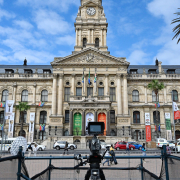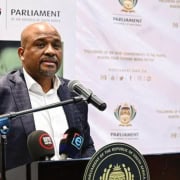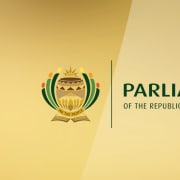|
Getting your Trinity Audio player ready...
|
Last year was a busy one for Parliament. The sixth administration’s term expired on 21 May 2024, just days before the general election on the 29th, a Government of National Unity (GNU) came into being for the first time in 30 years, an entire new Parliament was convened, previous matters had to be revived, and with several new parties in the House, the teething problems seemed more dramatic than usual.
One of Parliament’s core functions is that of oversight – holding the executive to account by scrutinising the quality of its work and taking steps to remedy deficiencies. “Oversight is a function granted by the Constitution to Parliament to monitor and oversee government actions,” says the legislature.
In turn, Parliament’s role comes under scrutiny from various stakeholders including the public, civic organisations, and academia, among others.
A new parliamentary oversight report, titled 7th Admin: The Review Nobody Escapes, looks at the seventh Parliament and its achievements, or lack thereof, in terms of its oversight function during the period from June 2024 to July 2025. The report is released by OUTA and Parlimeter and draws its data from the Parlimeter dashboard, reviewing all parliamentary committees, their oversight visits, and their public engagement activities.
“The report finds that the seventh Parliament has the tools, constitutional authority, public backing, and multi-party legitimacy essential to rebuilding trust in democratic institutions. What it needs now is the will to act with conviction.”
Key findings
The report states that despite various areas of progress and some well-performing portfolio committees, there are still many ways in which Parliament can improve.
The legislature was abuzz with activity in the period under review. There were 1 165 meetings of the various kinds of committees – nearly double the number recorded in the sixth Parliament’s final years – while MPs submitted 6 762 questions over the written, oral, presidential, and deputy presidential categories. Of these, says the report, only 2 507 were answered within the required deadline and 613 were not answered at all.
“The data reveal a paradox: Parliament is working harder; however, not necessarily smarter.”
The GNU itself – the largest government the country has ever had – presents a further challenge for MPs, who now have more meeting commitments, “straining oversight capacity and limiting the time and expertise dedicated to scrutiny”.
In the period under review, portfolio committees collectively convened 990 meetings – but although the average is some 33 meetings per committee, some committees sat more frequently and others less frequently. Trade, Industry and Competition, for instance, sat 57 times, but Planning, Monitoring and Evaluation only sat 21 times.
The DA (86%), Rise Mzansi (82%), and ANC (81%), respectively, were the parties who attended the most meetings. At the other end, the NCC (50%), BOSA (50%), and UDM (52%) showed the lowest attendance rates – though these are affected by factors such as the number of party members in Parliament and their capacity to attend all meetings.
“Oversight remains reactive rather than preventive,” says the report. “Corruption is exposed but seldom punished. Public trust continues to waver as many South Africans still perceive Parliament as a space of performance rather than reform.”
There is, predictably, a notable lack of following talk with action. “The data reveal both progress and fragility. Portfolio committees are busier than ever, but not necessarily more effective. Oversight visits uncover serious governance failures but rarely drive systemic correction.”
Other gaps revealed by Parlimeter include committee meeting delays and follow-up inconsistencies, structural constraints, political caution, and administrative overload – adding up to diminished impact.
Some notable weaknesses include the following:
- Delayed enforcement of the Auditor-General’s findings allows financial mismanagement to continue unchecked.
- Capacity constraints in committees such as the Portfolio Committee on Police, the Portfolio Committee on Justice and Constitutional Development, and the Portfolio Committee on Home Affairs weaken follow-through.
- Vacancies and frequent member reshuffling erode institutional memory.
- Legislative bottlenecks remained an issue, and by December 2024, 22 bills were still awaiting presidential assent.
In terms of public participation, the report shows “a Parliament becoming more open, participatory, and visible.”
The 2024/25 cycle affirmed that when Parliament listens and responds, citizen trust and democratic legitimacy deepen, said the report.
Recommendations
The report proposes several reforms which will help Parliament convert oversight into meaningful impact:
- Strengthen financial oversight and audit accountability by rigorously enforcing the provisions of the Public Finance Management Act and Municipal Finance Management Act (MFMA), specifically regarding MFMA Section 131, which requires ministers, directors-general, mayors, and boards to table remedial action plans following negative audit findings.
- Address vacancies and skills shortages, with quarterly reporting on critical vacancies, and vacancy dashboards with turnaround timelines per department.
- Ensure budget alignment and service delivery by interrogating departmental annual performance plans line by line, ensuring allocations directly support measurable outputs.
- Improve governance and consequence management by, among others, making live oversight trackers publicly accessible and recording recommendations, compliance deadlines, and follow-up actions.
- Accelerate infrastructure and service delivery oversight through quarterly site verification visits across key sectors, including Prasa rail corridors, housing schemes, water-treatment facilities, and school infrastructure. These inspections should result in published reports with enforceable deadlines for remedial action.
- Enhance intergovernmental coordination by institutionalising joint oversight weeks, enabling cluster-based committees to conduct coordinated inquiries into municipal service delivery failures.
- Modernise ICT and data systems by expanding digital platforms for e-submissions, Hansard access, and real-time tracking of committee recommendations and public submissions.
- Sharpen policy implementation and legislative management by demanding that departments finalise regulations within six months of new legislation being signed into law. Committees should publish scorecards that track whether laws are fully operational, partially enforced, or stalled.
- Rebuild public trust and participation by scaling up participatory oversight, and by revisiting its decision to increase political funding thresholds in August 2025, which undermines transparency by raising disclosure requirements and donation limits.
- Prevent state capture relapse by ensuring follow-through on the Zondo commission and NACAC recommendations, demanding clear Cabinet timetables for structural reforms, including the establishment of a permanent anti-corruption agency, reform of SOE boards, and creation of a whistle-blower fund.







